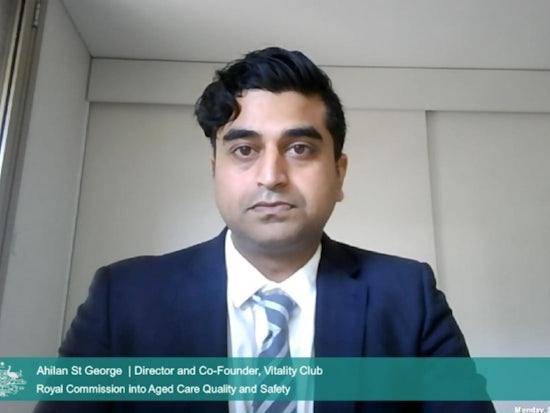ROYAL COMMISSION: Improvements, safeguards and under monitored home care
The Royal Commission into Aged Care Quality and Safety held three days of hearings, running from 31 August to 2 September, examining key design issues for a new home care system and how the sector would transition to a new home care system.

Vitality Club Director, Ahilan St George, says the HCP system is effective in delivering long term care but struggles with the quantity of people who need services. [Source: Aged Care Royal Commission
Topics covered during the hearings included employment and engagement arrangements plus qualifications and training for home care workers, safeguards for older people receiving care in their home, and regulation of services in individual’s homes and the community.
Senior Counsel Assisting, Peter Gray QC, highlighted during his opening statement that Australia has a high percentage of older people in residential aged care even though a majority of older people wish to stay at home for longer.
Improvements for home and community care
On the first day of the Commission, 31 August, Counsel Assisting Gray proposed different improvements for home and community care to providers in the sector to see if they would find the options viable or not.
Director and Co-Founder of Vitality Club, Ahilan St George, provided his opinion that the Home Care Package (HCP) system is effective in delivering long term care but struggles under the quantity and caseload of people who need to access the services.
He also advised the Commission that he believes it would be difficult to integrate the Commonwealth Home Support Program (CHSP) and HCP together.
“There are about 120,000 people receiving a Home Care Package with about 100,000 people waiting for a Home Care Package for about six to 18 months,” explains Mr St George.
“The CHSP program is grant funded by services about 800,000 to 900,000 people per year and I find it difficult to imagine a situation where the Home Care Package system can absorb those 900,000 people to deliver seamless care and immediate care for 1.2 million people when they struggle with the current 200,000 people.”
He believes that a single assessment workforce, the merger of the Aged Care Assessment Team (ACAT) and the Regional Assessment Service (RAS) would be ideal for seamless delivery of aged care services.
Safeguards for elder abuse in the home
On the second day of the Commission, 1 September, Commissioner of the NSW Ageing and Disability Commission, Robert Fitzgerald AM, and Director Operations, NSW Ageing and Disability Commission, Kathryn McKenzie, explained that the home has the highest risk in the aged care industry for elder abuse of older people.
“The risks that occur at home are quite substantial because there is not the line of sight that you normally see in residential services,” says Commissioner Fitzgerald.
“It’s not to say that people are more harmed or more damaged in the home, but without the line of sight that exists, the risks are higher.”
He states that the assessment is an important part of safeguarding older people in the home from elder abuse because they can identify vulnerabilities or risk early on in the process.
Commissioner Fitzgerald says older people need to be an active participant in their service delivery to give them as much decision-making capacity as possible.
“One of the most important parts of safeguarding is the ability of that person to actually make decisions on their own behalf or to influence those decisions in a very robust way,” says Commissioner Fitzgerald.
“The issue about invisibility, the reality for all of us that will get older, is that not only do we become invisible but our voice becomes unheard and in a safeguarding regime it’s critical that the voice of the individual is heard and their preferences are acknowledged. Without that, you won’t have a safeguarding system.”
Commissioner Fitzgerald says that by 2050 there will be an estimated 3 million receiving care services in the home, an advocacy system would need to be robust with multiple functions to be able to handle this load.
Home care not well monitored because of changes in residential aged care
On the last day of the Royal Commission, 2 September, Commissioner of the Aged Care Quality and Safety Commission (ACQSC), Janet Anderson PSM appeared on behalf of the ACQSC to explain the performance of the industry regulator.
Over the last two years, the ACQSC has received a lot of funding to hire more staff for assessing home care services, and specifically to undertake more assessments of the home care sector.
But Counsel Assisting pointed out that there has been a sharp decline in regulatory activity of home care services since 1 July 2019.
Commissioner Anderson says there was a transition over to the new ACQSC during that time along with the new quality framework which proved to be quite a lot to deal with.
“I believe we probably under-estimated the amount of change that would be required in the approaches that we took both in residential care and home services,” explains Commissioner Anderson.
“The new standards, from the outside, may not have looked much different, 44 expected outcomes under the old, 42 under the new for residential care, at least, but they were a very substantial change and we had to redesign our assessment methodology.
“We did so for residential care and made some adjustments to our approach to home services and are now taking further work forward in that regard.”
Commissioner Anderson eventually did admit that quality reviews and assessment contacts reported in the home care sector have declined through the 2019-20 period.
Counsel Assisting Gray also inquired into the ACQSC struggle to retain experienced staff, which Commissioner Anderson indicated has been an ongoing challenge.
The next Royal Commission hearings running from 14-22 September as a live webcast, covering funding, financing and prudential regulation.























